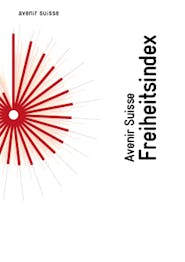While much is new in the latest Avenir Suisse Freedom Index, much has stayed the same. Aargau is once again top – despite the fact that it has lost points compared with last year. Based on the index’s economic components alone – factors such as the tax burden on an average family, the degree of public sector involvement in the cantonal economy or regional labour market regulation – Schwyz ranks first. When it comes to civil freedoms, such as free school choice, foreigners’ rights to participate in politics or how long it takes to gain building approval, Jura again comes out top. Because of lags in data availability, the latest index is based on statistics for 2014 and has been both extended in detail and refreshed graphically.
The addition of eight new yardsticks (see box) to the index has allowed important factors like work life balance, foreigners‘ rights and obligations, and labour market regulation, to be included. That expansion has helped the cantons of Neuchatel and Obwalden: the former has pioneered political rights for foreigners and is also attractive for its relatively short residence requirements before applications for Swiss citizenship are allowed, and its relatively high tax breaks for external childcare. Obwalden has gained ground thanks to its relatively low taxes for second earners in married couples, its lean public administration, relatively laissez faire labour market policies and its relatively short residency periods for citizenship.
Geneva remains in last place. The canton benefits in the ranking for its political rights for foreigners. But its high taxes and restrictive shopping hours remain burdens. Second to last Vaud, like other French speaking Swiss cantons – scores relatively well for civil liberties, but trails the Swiss average on the economic front.
New economic indicators
- Taxation of the second earner measures the marginal tax rate for the additional income of the lower earning partner in a married couple. Higher marginal rates are a disincentive to work and therefore count negatively in the freedom index.
- Tax deductibility for external child care influences incentives to work within the family and the division of labour. The higher the potential tax break, the more unbiased a basis for parents to decide whether to work or not.
- The number of public sector employees indicates of the canton’s role in the local economy. More public sector employees implies some displacement from private sector activity and is therefore a negative.
- Decentralisation allows individual municipalities within a canton and their citizens greater self determination: the more decentralised – measured by the relationship of municipal expenses to cantonal and municipal expenses combined – the greater the number of points awarded in Avenir Suisse’s ranking.
- Regional labour market regulations: flexible labour markets are a key precondition of a market economy, allowing equilibrium between labour demand and supply. The fewer the number of wide ranging sectoral pay deals in a canton, the better a regional labour market can function.
New civil indicators
- Public security is a fundamental condition of freedom. So the higher the proportion of solved crimes in relation to a canton’s expenditure on policing and security, the more efficient its public security.
- The lesser the political rights for foreigners – measured by their ability to vote, to elect and to be elected to local office – the more their freedom to decide on the use of their taxes and expenditure constrained.
- Long residency requirements for citizenship applications at municipal and cantonal level limit foreigners‘ mobility and are accordingly negatively weighted in the index.
Download Links to individual cantonal findings (pdf – in German and French only)
Aargau, Appenzell Ausserrhoden, Appenzell Innerrhoden, Basel-Landschaft, Basel-Stadt, Bern, Freiburg (D) / Fribourg (F), Genève (F), Glarus, Graubünden, Jura (F), Luzern, Neuchâtel (F), Nidwalden, Obwalden, Schaffhausen, Schwyz, Solothurn, St. Gallen, Tessin (D), Ticino (I), Thurgau, Uri, Vaud (F), Wallis (D), Valais (F), Zug, Zürich





